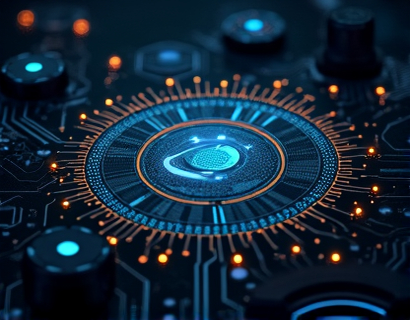Unlocking AI Autonomy: Elevating Business Efficiency with Advanced Intelligent Automation Solutions
In the rapidly evolving landscape of business operations, the integration of advanced intelligent automation solutions is becoming increasingly vital. These solutions, powered by cutting-edge AI agents capable of operating independently, are revolutionizing the way organizations approach task execution and process management. By harnessing the power of autonomous AI, businesses can significantly enhance their efficiency and productivity, positioning themselves at the forefront of their respective markets.
The concept of autonomous AI agents represents a paradigm shift in the realm of business automation. Unlike traditional automation systems that require constant human oversight and input, these advanced agents can perform tasks with minimal to no user intervention. This autonomy not only reduces the workload on human employees but also minimizes the potential for human error, leading to more consistent and reliable outcomes.
One of the primary benefits of autonomous AI agents is their ability to seamlessly integrate with existing business processes. These agents are designed to understand and adapt to the specific workflows of an organization, ensuring that they can take over repetitive and time-consuming tasks without disrupting the overall operation. This seamless integration is achieved through sophisticated algorithms and machine learning techniques that enable the AI to learn from data and improve over time.
For forward-thinking organizations, the adoption of autonomous AI agents is not just a technological upgrade but a strategic move to stay competitive. In industries where efficiency and accuracy are paramount, such as manufacturing, finance, and healthcare, the implementation of these advanced solutions can lead to significant performance enhancements. By automating routine tasks, employees can focus on higher-value activities that require human creativity and critical thinking, thereby driving innovation and growth.
The development of autonomous AI agents involves several key components. At the core is the natural language processing (NLP) capability, which allows the AI to understand and interpret human language. This is crucial for tasks that involve data entry, customer service, and document processing. Additionally, computer vision technologies enable the AI to interpret and act on visual data, making it suitable for applications such as quality control and predictive maintenance.
Another critical aspect of autonomous AI is its decision-making ability. Advanced algorithms and machine learning models enable these agents to analyze complex data sets, identify patterns, and make informed decisions in real-time. This capability is particularly valuable in dynamic environments where conditions change rapidly, and quick responses are necessary. By automating decision-making processes, businesses can react faster to market changes and customer needs, gaining a competitive edge.
To achieve true autonomy, AI agents must also be capable of self-learning and adaptation. Through continuous learning, these agents can refine their performance based on feedback and new data inputs. This self-improvement cycle ensures that the AI remains up-to-date with the latest industry standards and best practices, reducing the need for manual updates and maintenance. As a result, businesses can enjoy long-term cost savings and sustained operational efficiency.
The implementation of autonomous AI agents also brings about significant operational benefits. By reducing the reliance on manual processes, organizations can lower labor costs and minimize the risk of human errors. This not only improves the accuracy of tasks but also enhances overall productivity. Moreover, the ability to scale AI solutions easily means that businesses can quickly adapt to growing demands without a proportional increase in resources.
In addition to operational efficiencies, autonomous AI agents contribute to a more sustainable business model. By optimizing resource usage and reducing waste, these solutions help organizations lower their environmental impact. For instance, in manufacturing, AI-driven predictive maintenance can prevent equipment failures and extend the lifespan of machinery, reducing the need for frequent replacements and repairs. This not only saves costs but also contributes to a more sustainable use of resources.
The adoption of autonomous AI is not without its challenges, however. One of the main concerns is the initial investment required to implement these advanced systems. While the long-term benefits are substantial, the upfront costs can be a barrier for some businesses. However, many organizations are finding that the return on investment is swift, with significant reductions in operational costs and improvements in productivity justifying the expense.
Another challenge is the need for skilled personnel to manage and maintain these AI systems. As AI technology becomes more complex, there is a growing demand for professionals with expertise in AI, machine learning, and data science. Organizations must invest in training and development programs to ensure their workforce is equipped to handle these advanced technologies. Collaboration with educational institutions and continuous learning initiatives can help bridge this skills gap.
Despite these challenges, the potential benefits of autonomous AI are undeniable. Businesses that embrace this technology are likely to experience a transformation in their operational capabilities. The ability to automate routine tasks, make data-driven decisions, and adapt to changing environments sets these organizations apart from their competitors. As the market continues to evolve, those that fail to adopt autonomous AI solutions may find themselves at a disadvantage.
The future of business automation is undoubtedly tied to the advancement of AI autonomy. As technology continues to progress, we can expect even more sophisticated AI agents that require even less human intervention. The next generation of AI solutions will likely integrate more seamlessly with other smart systems, creating a network of interconnected intelligent agents that work together to optimize business processes. This interconnectedness will further enhance efficiency and open up new possibilities for innovation.
In conclusion, the integration of advanced intelligent automation solutions powered by autonomous AI agents represents a significant leap forward for businesses aiming to enhance their efficiency and productivity. By embracing this technology, organizations can streamline operations, reduce costs, and stay ahead in a competitive market. As the landscape of AI continues to evolve, those that proactively adopt these solutions will be well-positioned to thrive in the future of business.











































